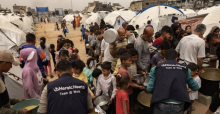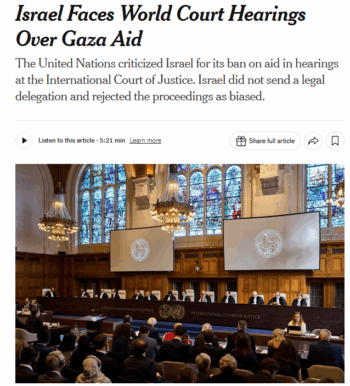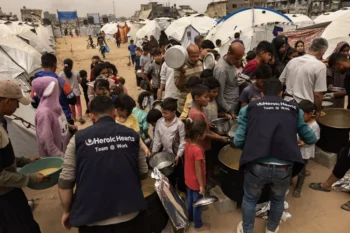
More than two months ago, Israeli Prime Minister Benjamin Netanyahu announced a complete blockade of aid—including food, water and medical supplies—from entering the besieged Gaza strip. It’s a severe escalation of Israel’s now 19-month genocide against Palestinians in Gaza—and what the World Health Organization (5/12/25) has described as “one of the world’s worst hunger crises, unfolding in real time.”
With no replenishing stock, aid groups have begun running out of supplies to distribute to families in need.
The UN Relief and Works Agency (5/16/25) reports that their “flour and food parcels have run out,” and that “one third of essential medical supplies are already out of stock.” More than a week ago, World Central Kitchen reported that they no longer have supplies to cook hot meals and bake bread for starving families—they’ve since repurposed their pots to distribute filtered water.
With Gaza’s entire population experiencing crisis-level food insecurity, and with three-quarters facing “emergency” or “catastrophic” levels of deprivation, the famine has been recognized by Human Rights Watch interim executive director Federico Borello as “a tool of extermination.”
‘To pressure Hamas’

The New York Times‘ online headline (4/28/25) reduces the prospect of mass starvation to the innocuous phrase “Gaza aid.”
At first glance, the April 29 New York Times offered what many would call an objective account with the headline: “UN Faults Israel Over Blockade of Aid for Gaza” (web version here: 4/28/25).
A closer look at the piece however, reveals the Times’ usual spinelessness in its Gaza coverage, unquestioningly accepting Israeli framing in its supposed right to carry out its ongoing genocide.
Reporter Aaron Boxerman writes up top:
For more than a month and a half, Israel has blocked food, medicine and other relief from entering the devastated Gaza Strip in an attempt to pressure Hamas to free the dozens of remaining Israeli hostages there. It argues that its blockade is lawful and that Gaza has enough provisions despite the restrictions.
That frame looks like a simple sentence, but note that it tacitly requires you to accept that Israel determines whether people in the Gaza Strip can receive the basics for human life—asking why Israel is in charge of Palestinians’ food and medicine is beyond this conversation’s walls.
Then, without even a comma, we are told that the denial of life to all Gazans is “an attempt to pressure Hamas”—Boxerman makes a silent skip over the acceptability of collective punishment there, and a frictionless transmission of Israel’s rationale for its actions. That Israel has itself deprioritized the release of the hostages vis-à-vis the reoccupation of Gaza is off the page. But that Israel “argues” the blockade is lawful and that Gaza has what we’re told to accept as “enough provisions”? Those are statements that the Times suggests can stand alone.
Who you choose to believe

The New York Times (4/28/25) describes the relationship between Israel, which has announced a policy of starving millions of people, and the UN, which is trying to force Israel to allow food aid into Gaza, as “fraught with mutual recrimination.”
But aha, you say, here comes another view—though it’s already set up by being in the responsive, “others differ” position:
The United Nations and aid groups say the blockade has further harmed Palestinians already reeling from more than a year and a half of war in Gaza, which has killed tens of thousands of people, displaced well over a million and leveled large swaths of the enclave’s cities.
While true, and ostensibly sympathetic, what with the reeling and the leveling, notice how this is not a direct response to the claims in the lead: that the blockade is lawful, and that Gaza has all it needs. It’s just a statement that the people of Gaza have suffered tremendously. And that even that is just a thing the UN and aid groups “say.”
You could tighten this all to the NBC News headline (4/17/25) Belén Fernández clocked in her piece on coverage of Israel’s starvation of Gaza (FAIR.org, 4/25/25): “Aid Groups Describe Dire Conditions in Gaza as Israel Says There Is No Shortage of Aid.”
All of this depends on who you choose to believe, seems to be elite media’s message—with a few winky-wink tips on who to believe.
Boxerman goes on to report:
Ordinary Gazans have lamented the rising price of basic commodities under the pressure of the blockade. In some cases, the restrictions have turned the quest for getting enough nutritious food into a daily struggle.
It’s like an unfunny game of “find the qualifier”: What’s an “ordinary” Gazan, and who are the extraordinary ones who deserve to starve? What defines the “some cases”? Is un-nutritious food freely available? When does a “quest” become a “struggle”?
It’s a perverse way to describe a situation where widespread starvation is not looming or imminent, but well underway. But it’s an excellent way to tell people they don’t necessarily, if you look at it a certain way, need to give a damn.
By Janine Jackson May 16, 2025
Janine Jackson is FAIR’s program director and producer/host of FAIR’s syndicated weekly radio show CounterSpin. She contributes frequently to FAIR’s newsletter Extra!, and co-edited The FAIR Reader: An Extra! Review of Press and Politics in the ’90s (Westview Press). She has appeared on ABC‘s Nightline and CNN Headline News, among other outlets, and has testified to the Senate Communications Subcommittee on budget reauthorization for the Corporation for Public Broadcasting. Her articles have appeared in various publications, including In These Times and the UAW’s Solidarity, and in books including Civil Rights Since 1787 (New York University Press) and Stop the Next War Now: Effective Responses to Violence and Terrorism (New World Library). Jackson is a graduate of Sarah Lawrence College and has an M.A. in sociology from the New School for Social Research.
